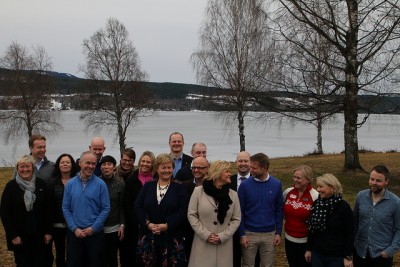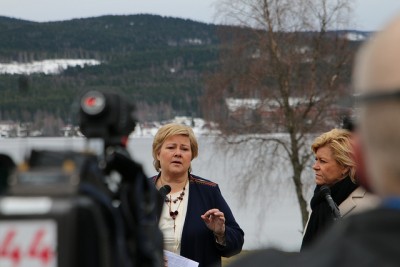NEWS ANALYSIS: Siv Jensen was making her debut this week as her party’s first-ever finance minister at the government’s deceptively festive annual launch of state budget negotiations. It’s important for both her and the Progress Party she leads to put their clear party stamp on the state budget they’ll unveil later this year.

It’s also the first time in years that a government lead by the Conservative Party, in partnership with the Progress Party, is in charge of budget negotiations. There’s bound to be quarreling, but as NRK political commentator Lars Nehru Sand observed when negotiations got underway Monday, there would also be quarreling even if a single party had control of the government: Every single minister sitting around the table is expected to fight for his or her own projects and priorities, often at the expense of their fellow ministers.
The ministers exuded good spirits as they arrived at the Hurdalsjøen Hotel just north of Gardermoen on Monday. Norwegian media was waiting as they piled out of their government cars in casual dress, and lugged heavy cases full of budget documents themselves into the hotel along with their overnight bags. It’s traditional for the ministers to appear jovial and relaxed heading into the talks, which are said to quickly become anything but jovial or relaxed as soon as the doors close and they get down to business.

Jensen, whose party already has made quite a few concessions for the sake of government unity, now needs to address frustration within her own party by being among the sluggers and making political demands of her fellow ministers. She needs to prove to her party, which won government power for the first time ever last fall, that they indeed have some power, and that it is better to be in position than in opposition. Winning budget support for Progress Party programs and priorities is a major means of doing so.
She repeated the government’s agreed position that they want to reduce taxes and help make Norwegian business and industry more competitive. The Conservatives, though, want to mostly lower taxes on businesses while Jensen’s Progress Party wants to give tax relief to what they call folk flest – a majority of ordinary folks. That must be negotiated, but Jensen will need to come away from the talks with some real and visible cuts in taxes and fees paid by the general population. Both the Conservatives and the Progress Party have also been keen to reduce or get rid of Norway’s controversial formueskatt, the “fortune tax” assessed on net worth year after year. Neither Jensen nor Prime Minister Erna Solberg would reveal how far they expect to come on that.

Jensen said with a smile on national TV Monday evening, after the first round of talks, though, that “I think you will see more use of oil money” in the budget that’s eventually presented to the Parliament. As a general rule, the government can use up to 4 percent of the size of the so-called Oil Fund, the sovereign wealth fund where oil revenues are stashed for the benefit of future generations. The fund reported its second-best results ever earlier this year and continues to grow, meaning the new conservative government can tap into quite a bit of money. Jensen has long advocated investing more of the fund’s money in needed infrastructure projects in Norway instead of overseas stock markets, but will likely also exercise restraint in order to avoid setting off inflation.
Both Jensen and Solberg claimed they will hammer out a budget that will reflect “what’s the most important for the Norwegian economy.” They worry that unemployment will rise in Norway, after a week in which two of Norway’s biggest companies, Statoil and Telenor, made announcements that are leading to hundreds of job cuts.
The most pressure arguably remains on Jensen as talks moved into their second of three days on Tuesday. Her noisiest party fellows from the relatively far-right side of it have made it clear they have “great expectations” for the state budget for 2015, which ultimately will be presented in October. Deputy leader Per Sandberg, for example, claims that the party’s government partner and support parties “must wake up” to what he and Member of Parliament Christian Tybring-Gjedde see as the threat posed to Norway’s economy by immigration. They also want reductions in taxes on cars, to make it cheaper to buy them, arguing that new cars pollute less than old cars. It may be hard to cut taxes on cars, though, because they help fund the new roads the party also wants.
“There is great impatience in the party now,” Tybring-Gjedde told newspaper Dagsavisen. “It must be shown (in the budget) that we sit in the government. Cutting car taxes, or getting rid of the NRK license (which everyone must pay to watch any TV in Norway) are things that folks would mark.” It’s time for Jensen and her fellow Progress Party ministers, they claim, to deliver.
newsinenglish.no/Nina Berglund

